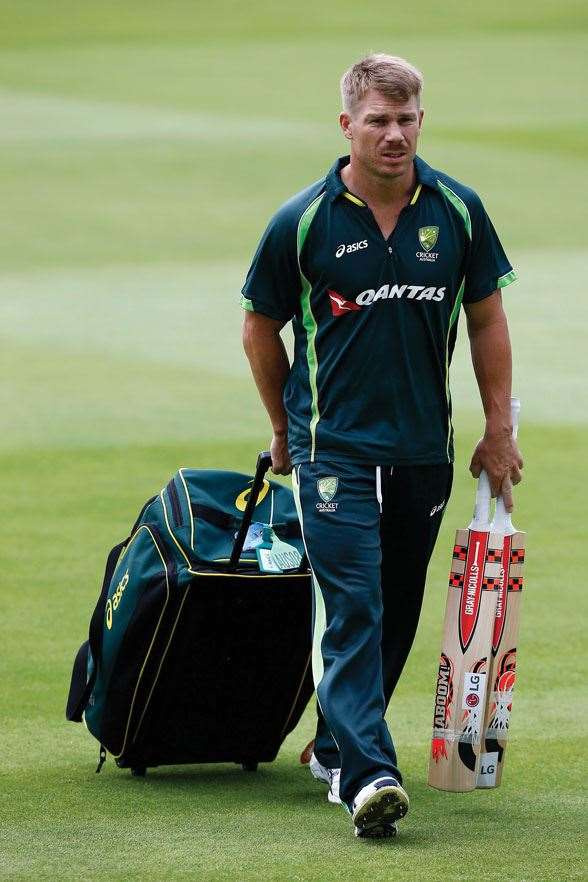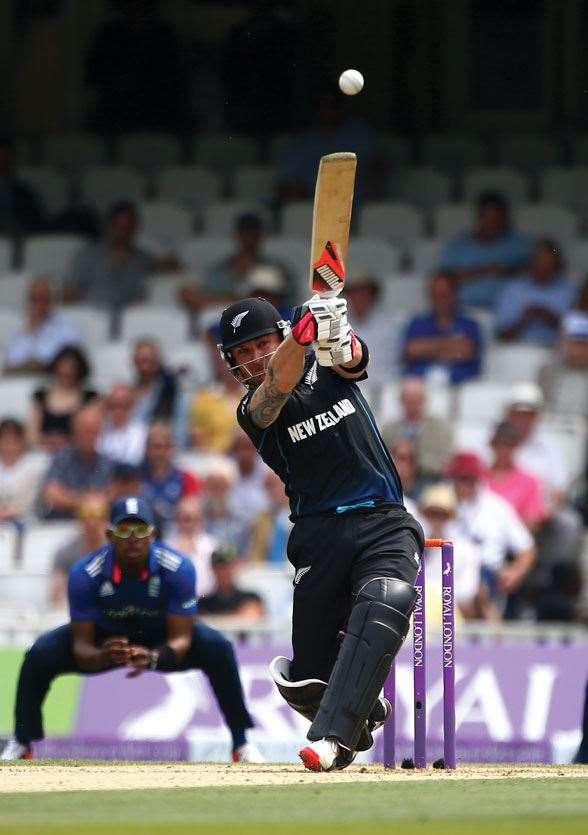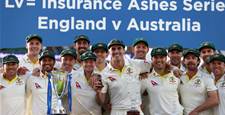This month's three-Test series poses intrigue aplenty.
WARNER TURNS THE CORNER
David Warner has been given a leadership role. That in itself is a remarkable thing. Warner carries more contradictions than Muhammad Ali – without so much of the complexity. When he got into trouble off the field, even venturing into taboo territory by punching a member of an opposing team, that was kind-of expected. When he mouths off at opposition on the field, that’s expected. When he acts as the straight-talking mouthpiece for the entire Australian team, often speaking the unspeakable, that’s expected, too. Telling opponents after only one Test of a series that he could smell their fear, accusing them of cheating and hypocrisy, pointing out their inferiority and annoying them once play began ... that was Davey’s metier.
But vice-captaincy of the Australian team? Well, this current development is not entirely unexpected. Warner’s capable of surprising us. He’s always been able to pull out the occasional white rabbit. He did make an implausibly quick adjustment to Test cricket, having come through a (then) very unconventional route that was paved with precious little first-class cricket. He has established himself as Australia’s sine qua non at the top of the order, even without Rogers. The question has never been “will Warner open?” but rather “who will partner Warner?” He has proved that his technique is sound. He even carried his bat the last time New Zealand jumped us in a Test, in Hobart, 2012.
He’s pared his prickly persona along the way. He did settle down after being punished for the Joe Root incident. He has moderated his off-field life since his marriage to Candice Falzon, and the arrival of his first child.
But leadership is a quantum jump, even for Dave. It is unexpected in the sense that Warner this time seemed to make an internal change that didn’t involve public chastisement, sensationalistic publicity or some kind of controversy. That change was to cease, forthwith, the abuse, harassment and ridicule of opposition team members. It was as though Warner – never one to entertain superfluous details – suddenly realised that such behaviour was extraneous to the contest. What else could it be? Getting him to change certain aspects of his behaviour was like asking Ben Stokes to change his spots.
Even as recently as last summer’s India series, Warner was lambasted as a boofheaded racist for telling an Indian player, who was giving as good as he got, or vice-versa, in Hindi, to “speak English”.
But somewhere between that series and the West Indies bracket back in May-June, some kind of Occupy movement occurred between Warner’s ears. He actually began making aberrant public comments, talking down the sledging aspect of his game – of the game – and despite some choice potential victims like Root and Stokes, who takes every bait and invariably bites off more than he can chew, Warner was as good as his word during the Ashes campaign.
And now, just like that, the explosive opener is a statesman.
Of course this presents interesting questions: will Warner serve as a kind of barometer? Do Australian cricket teams lose mojo when not being obnoxious, unpleasant and overly-aggressive? Or would a great team have won that last Ashes series anyway? Will Dave Warner score runs anyway? Will he play an }indispensable leadership role for Smith anyway? Certainly Smith proved an onfield diplomat in last-season’s series against India, and defused, with a moderate, sensible approach, some potentially ugly incidents that Clarke might not have been inclined to resolve in the same way. Furthermore, he went on to win a Test purely on merit. Toward the end of the Indian series, Smith made it plain that “send-offs” were “not the way to go forward” for the Australian team. Might it be that Smith has – tacitly or explicitly – sent out a message to Warner that any deputy of his should evince the same winning traits?
Might this be the reason world cricket’s most active and successful stirrer has turned demurrer?
And where does this season’s opposition captain, McCullum, fit in? Warner’s change of heart was almost exactly contemporaneous with the peaceful revolution initiated by McCullum in the two-Test series against England. This might have been nothing more than a conspicuous coincidence. On the other hand, the cricket world today is a small place. Has Warner been influenced by behavioural moderates who are able to forcefully demonstrate that exciting cricket and aggressive leadership have little to do with onfield animus?
CAPTAIN SMITH
Steve Smith’s rise to the most important post in the land has been as meteoric as Warner’s to the deputy job. The difference for Smith is that his way was not marred by self-strewn thistles and ditches. He’s had that one controversy, though: the Ben Stokes dismissal in the post-Ashes one-day series. Smith defended the “obstructing field” action taken by the umpire as fair, decided recalling Stokes was not an option, and though it seemed it was all by the book, Smith’s grasp of the “spirit” of the game was brought into question. Accusations of dishonesty were often tacit but significant nonetheless.
Still, Smith’s onfield approach has been praised. He doesn’t generally have it in his nature to fuel disputes, and might be the perfect candidate to usher in the new detente – along with the Mahatma of this revolution, his opposing captain for this series.
Temperamentally, Smith seems uninterested in anything but playing the game to an excellent level, and there’s no doubt he’ll aim for leadership by powerful example. He might develop into one of those Australian captains, like many before him, whose batting average escalates as he shoulders the “burdens” of leadership.
BATSMAN SMITH
He scored three tons as captain against India in a series in which he scored four – one in every Test, and after the Ashes series, he expressed his desire to retain that level of performance as captain. Unrealistic though it might sound, it’s a sign of his dogged devotion to excellent performance.
It does, though, have a hint of that feeling about it: a man whose self-expectation is so high, it eventually prevents him exercising the very attributes that allowed him to have that expectation in the first place. On the other hand, Smith is a very unusual character. The sort of driving self-motivation that enabled Justin Langer to be one of our opening greats rapidly went exoteric. He wanted to spread the word to the team, as quickly as possible – but then, he belonged to a team replete with powerful characters. They didn’t need much external incentive. Smith’s self-motivation is esoteric. It makes little shifts inside his head, little calibrations to his performance, that are his alone, and it makes them privately. His way of spreading the gospel of success is to be one. However, he’s well-liked and his views, put quietly but firmly, are heard.
Leadership by pure example is great in the right environment, with the right mix. Smith will be doing without some recently lost heavy-duty talent, leadership and experience in Rogers, Ryan Harris and Clarke. Furthermore, he’ll have a shifting population for a while: Starc is under a cloud, Cummins is injured, batsmen and quicks will be tried and rejected, and a lot of short-form specialists will be needing to step up in ways they’ve never been required to step before. Ace short-form cricketers with little first-class experience are becoming the norm, but Smith really is dealing with some unprecedented situations as they infiltrate the Test squad.
We’re tipping that Smith, perhaps because he made the same transformation as Ian Chappell and Steve Waugh – indeterminate all-rounder to formidable batsman – might just advance his average while captain, as they did. Chappell’s career average was 42, but it was 50 as captain. Waugh’s was 50, but it was over 51 as captain. Smith seems to thrive on such expectations, and we wouldn’t be surprised if he turns in a remarkable summer, peppered with the odd “did you see that?” innings – after all, if Smith improves his average, he won’t be going about it the way your garden-variety batting star does it. This man finds gaps that barely exist, and his shotmaking is every bit as inventive as De Villiers’.
APPRECIATING NEW ZEALAND
There has always been a lot to admire about Kiwi cricket. They’ve put it up the Aussies on certain notable occasions, and though they dust off the old “underarm incident” every time a trans-Tasman battle looms, they always find other ways to give Aussies something to take on the chops.
Their Greatbatches, Edgars, Wrights, Turners, Morrisons, Bonds, Hadlees, their various Bracewells, Cairnses and Crowes – they’ve all given the Aussies a good going over at some stage.
But Aussies really appreciate the standard of New Zealand cricket, especially since the six-Test split series of 1973-74, during which the Kiwis won their first Test against Australia. This admiration stems mainly from the fact that we’re aware of the battle to keep the game internationally competitive across the ditch.
Most of New Zealand’s best athletes are attracted to the rugby codes, and they have a very small talent pool to choose from. Despite this, they continue to perform, extracting every ounce of capability and effort from their squads, and occasionally they KO big, powerful rivals. They won a series against us in 1985-86, and in 1979-80 brought down the fearsome and fierce West Indies on home soil.
One major factor in these victories, apart from the efforts of the historically significant champions they occasionally produce, has been leadership. Beginning with the canny Bevan Congdon in the 1970s, they understand the value of strong and astute leaders, and subsequent captains like Howarth, Coney, Jeff Crowe, Fleming, Vettori, and of course, McCullum, have all carried the mantle with dignity and success, even if it didn’t always translate into victory. It’s been no enviable job in a country that doesn’t exactly pullulate with aspirants to international cricketing greatness.
And those one-off champions – what champions they’ve been! Glenn Turner, Richard Hadlee, Martin Crowe, Daniel Vettori, Danny Morrison, Shane Bond, and now Kane Williamson, Martin Guptill, McCullum, Southee and Boult have been admired all over the cricket world. As a team, the Kiwis have transcended “blue-collar.” They are truly gold-label now, with many victories left in them, and it’s not far-fetched to wonder whether they’re capable of taking this series against their antipodean arch-rivals.
Aussies love a fearless competitor, and no matter what the state of their cricket, Kiwis fear no one. The fact is, the Kiwis are actually exciting, and we Australians should be excited that cricket is in such healthy condition so close to our own shores.
Furthermore, their team this time around is full of record-breakers and magic-makers, like ...
A CAPTAIN’S CLASS
Brendon McCullum is an exciting batsman to watch in full flow. If he didn’t invent the scoop shot, he certainly perfected it enough for it to be dubbed the “McScoop”. McCullum’s Test average of 38.76 is no indication of his value as a player. Since he said he’d no longer be able to keep wicket in Tests due to back problems, in 2012, he’s been a specialist batsman. And he’s gone berserk. In 2014, The Don possessed him for a short time, and he made a string of jaw-dropping Test scores: 224, 302, 202 and 195. There’s not a team in world cricket that wouldn’t pick him.
If he’d added five runs to last year’s 195 against Sri Lanka, it would have been the fastest double-ton in Test history, by several long shots. He’s also clouted the most Test sixes in a calendar year, ten more than the next best, Adam Gilchrist.
Some of his Test innings have been truly astounding, given the circumstance. Take, for instance, his 302 against India, scored in the third innings of a game that was as good as lost. With only five wickets in hand, New Zealand was still 152 runs from preventing an innings defeat. They wound up on an unassailable 680, and the match was drawn. It won New Zealand the series.
He held the record for the highest T20 International innings, was first to score two T20I centuries, and was fastest to 1000 international T20 runs. This year, he scored the fastest half-century in World Cup history.
KIWI QUICKS
New Zealand is currently blessed with a nice little fund of very good fast bowlers. Australians are familiar with what Boult and Southee can do. While Boult took 5-27 against us in that classic pool game in the last World Cup, Southee was just as dangerous. He’d destroyed England with 7-33 in their pool match, helping his team to a win with – get this! – 37.4 overs to spare! Bracewell has saved his Test best (6-40) against us, and Matt Henry, who consistently pitches them up around 150, is new to Test cricket, but has outstanding averages in all other forms of the game – usually a good indicator of where his Test form is headed.
CANING KANE
Kane Williamson is New Zealand’s De Villiers – one of those all-round aces, good at everything he’s ever tried, including academically. A seriously good batsman who averages 47.78 in Tests and 48.79 in ODIs, Williamson attained 3000 Test runs faster than any Kiwi. Two Williamson centuries helped the Kiwis to an away win against the West Indies. One ton and a record partnership with McCullum squared a series against Pakistan. His double-ton against Sri Lanka in 2015 featured another record partnership, with BJ Watling, and won the home side a series.
Williamson is a rare phenomenon: a batsman who can win games in short or long formats with mastery of technique, a razor eye and precision placement. His six to win the pool match against Australia in one of the greatest ODI slugouts in history said it all. It was beautifully timed. His brutality was elegant, and his little, fleeting fist-pump reaction typically understated. He has all the hallmarks of a prodigy to rival any of today’s sensations with the blade.
CYCLONE GUPTILL
In the last World Cup, Martin Guptill acquired the record of highest score in a World Cup and the second-highest in ODIs with his cyclonic 237 not out. He held the record for the most runs in a three-match ODI tournament, with 330. It included back-to-back unbeaten tons. His Test average is currently around 30, but like a few of his compatriots,
he seems capable of busting out with huge, devastating innings when it’s least expected.
McCULLUM'S MANAGEMENT
Like Angelo Mathews of Sri Lanka, Brendon McCullum is admirable on many levels: firstly, his team wins the matches they should win. McCullum understands more than most how much this is about attitude. Secondly, his team often wins, or at least saves, matches they should lose.
Thirdly, he’s a high-quality man. When it comes to successful leadership traits, McCullum ticks just about every box. He plays a winning game, and expects his team to do the same. He’s a captain who, like Smith, picks up the cudgel and leads by example. He’s intelligent and shows perspective whenever he needs to make a public statement – and humour where appropriate. Moreover, he shows respect. He’s aware of the power of the gesture, and the way he handled his team against Pakistan in the wake of the Phil Hughes tragedy last season when the second day was postponed, and players wanted to terminate the entire series, was more than merely admirable. It was as noble as it gets. McCullum himself scored a savage 202, and his non-celebratory mood suggested he did it to resolve his own feelings about the death of his former NSW team-mate.
Thirdly, he’s tactically a very astute captain. Not only does he utilise his bowlers and adjust his fields thoughtfully, he does it with an iron fist in a velvet glove. He sets the most attacking fields possible given the type of bowler and the circumstance. His sole aim, of course, is winning, but he’s a striking example of a man who concentrates on the merits of his own team, and needs no assistance from by-play or mouthiness. As a result, his team, like the man himself, is centred. Such an approach spreads to fans, who become aficionados of the cricket played, rather than voyeurs of tawdry sideshows.
McCullum has done one thing everyone loves their captain to do: he makes magic. So many times now, he’s made decisions – or scored runs – that have won, or saved, games for New Zealand. At the Basin in January 2015, he set Sri Lanka 389 runs to get with ample time left, backing his bowlers to beguile the Sri Lankans into being aggressive on a batting pitch, and setting supportive and at times imaginative fields. It worked. The wicket wasn’t helpful. The captaincy was. They got Mathews and Sangakkara by lunch and it was downhill for the Lankans after that.
For many reasons, Brendon McCullum in action is a man worth watching.
McCULLUM VS SMITH
When Steve Smith failed to recall Ben Stokes after his controversial dismissal for obstructing the field, McCullum weighed in with some feather-light comments about a lost opportunity to assert the spirit of the game over its law. It was intended as a sharing of experience; a didactic observation that, in retrospect, Smith himself might have preferred a different outcome. Harmless enough, really. It was a complete beat-up, but we know that most people seem to respond to beat-ups, suspending considered opinions the way wrestling fans and political partisans suspend disbelief. This one has the tinct of that overrated vice, hypocrisy. You see, McCullum once ran out Murali as he walked down the pitch to congratulate Sangakkara on a ton, and though he has admitted he himself has made mistakes of judgement, that doesn’t mean the papier-mache “enmity” between him and Smith won’t have some high-octane fuel poured on it if there’s a mere spark of controversy.
AUSTRALIA'S LATERAL PROBLEM
The myth is growing that Australians cannot handle the ball that moves laterally, in the air, off the pitch, launched by mediums, quicks or spinners. Of course, the fact is that this applies to any team and always has – if the bowling is of sufficient quality and conditions suit. Even the West Indian juggernaut of the 1980s occasionally screamed to a halt in places like the sub-continent, the SCG, against Imran Khan, or on that one notable occasion, against New Zealand.
Having said all that, though, we must say that the Kiwis have a substantial enough arsenal of all the above to trouble the Aussies, in Australia, and especially in the return series over in Long White Cloud Land, where conditions can sometimes be as close to “English” as it gets.
A FIELDING FEAST
Again, McCullum leads by example, and his team follows. This team has swallowed some remarkable catches and snagged some breathtaking runouts in the last few years. But even more telling is their ability to strangle their opposition just by disallowing runs with parsimonious, yet dangerous, bowling, and cutthroat fielding. The fielding is worth a half-ton per innings. Of course, great fielding is a hallmark of Australian cricket as well, and both sides feature men capable of freakish feats. In the last few years, Guptill, McCullum, Williamson, Elliott, Smith, Warner, Maxwell and even Starc and Johnson have taken some freakish grabs.
PEOPLE POWER
This is the best reason of all for cricket lovers to turn up. Look, Cricket Australia has been this magazine’s friend over the years, but really – Big Three? Let’s leave it to the fans: should Australia feel proud to be one of the “Big Three” who run world cricket? Or should they be ashamed to have any part of a compromised cabal that cares little for the development of the game? To the nose of the average Aussie fan, this should reek, pungently.
Fans should turn up to games this summer not just to watch the cricket, but to make a statement. This is no mock battle for the cliched “spirit” of the game. This is a fight for its soul.
If the ICC and cohorts have their way, cricket in New Zealand, West Indies, Sri Lanka, Pakistan, South Africa and more recent additions that were beginning to bud on the international cricket vine will not just wither on that vine, they will be cut off.
Make up some banners. Make it known that New Zealand, a nation that has traditionally been under-resourced in every way, is admired and appreciated for the successes it has enjoyed so far. Do the same for the West Indies.
This is about supporting the very survival of a national team that has fought hard to endure in an exacting environment. New Zealand deserves to be an equal member of the cricketing family. Notions of a “select few” should be anathema even to Indian members of the International Cricket Council, who were victims for decades of superior English attitudes, and scheduled to the sidelines. It certainly should sit uncomfortably with both antipodean sides and their fans. This ICC regime makes the old one look positively munificent in comparison.
This is not about defending “tradition.” It goes beyond that. The entire game as we know it will be consigned to the past. Australia can act like a cashed-up crony, or it can stand up for the soul of the game – and none represent that right now more than New Zealand.
Related Articles

Course Review: Cape Kidnappers

Review: Glenelg Golf Club
















